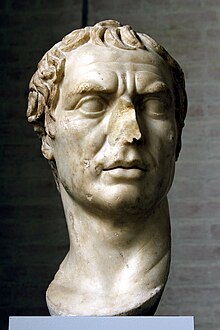
Back Publio Cornel Escipión l'Africán AN شيبيون الإفريقي Arabic شيبيون الافريقى ARZ Escipión l'Africanu AST Сцыпіён Byelorussian Сципион Африкански Bulgarian ཞི་པི་ཨ་ཨ་ཧྥེ་རི་ཁ་ནུའོ་སི། Tibetan Scipio Africanus Breton Publi Corneli Escipió Africà Catalan Scipio Africanus Czech
Scipio Africanus | |
|---|---|
 Bust likely of Scipio Africanus (formerly identified as Sulla), originally found near his family tomb[1] | |
| Born | 236 or 235 BC |
| Died | c. 183 BC |
| Nationality | Roman |
| Known for | Defeating Hannibal |
| Office |
|
| Spouse | Aemilia Tertia |
| Children | 4, including Cornelia |
| Parent |
|
| Relatives | Scipio Asiaticus (brother) Scipio Aemilianus (adoptive grandson) Tiberius and Gaius Gracchus (grandsons) |
| Military service | |
| Allegiance | Rome |
| Branch/service | Roman army |
| Battles/wars | |
Publius Cornelius Scipio Africanus (/ˈskɪp.i.oʊ/, /ˈsɪp-/, Latin: [ˈskiːpioː]; 236/235–c. 183 BC) was a Roman general and statesman, most notable as one of the main architects of Rome's victory against Carthage in the Second Punic War. Often regarded as one of the greatest military commanders and strategists of all time, his greatest military achievement was the defeat of Hannibal at the Battle of Zama in 202 BC. This victory in Africa earned him the honorific epithet Africanus, literally meaning "the African", but meant to be understood as a conqueror of Africa.
Scipio's conquest of Carthaginian Iberia culminated in the Battle of Ilipa in 206 BC against Hannibal's brother Mago Barca. Although considered a hero by the Roman people, primarily for his victories against Carthage, Scipio had many opponents, especially Cato the Elder, who hated him deeply. In 187 BC, he was tried in a show trial alongside his brother for bribes they supposedly received from the Seleucid king Antiochos III during the Roman–Seleucid War. Disillusioned by the ingratitude of his peers, Scipio left Rome and retired from public life at his villa in Liternum.
- ^ Etcheto 2012, pp. 274–278.
© MMXXIII Rich X Search. We shall prevail. All rights reserved. Rich X Search